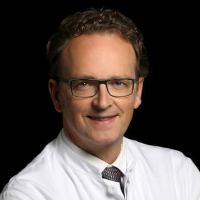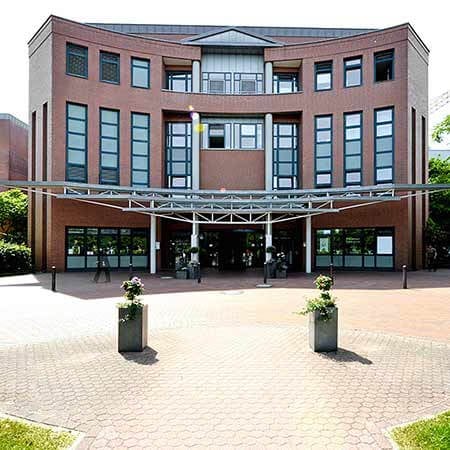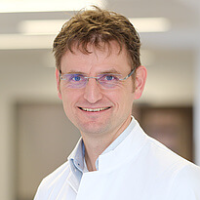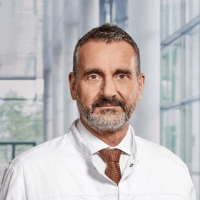Aortic Valve Stenosis — Aortic Valve Replacement: treatment in the Best Hospitals of Germany
Treatment prices are regulated by national law of the corresponding countries, but can also include additional hospital coefficients. In order to receive the individual cost calculation, please send us the request and medical records.

Department of Cardiothoracic Surgery
According to the Focus magazine, the Department of Cardiothoracic Surgery ranks among the top German medical facilities specializing in the surgical treatment of diseases of the cardiovascular system and lung cancer! The department offers the full range of surgical services for the treatment of diseases of the cardiovascular system, respiratory tract, including heart and lung transplantation, artificial heart implantation. The therapeutic options include aortic surgery, coronary artery bypass grafting, transplantation surgery, surgical treatment of heart rhythm disorders (arrhythmias), minimally invasive surgery, surgical treatment of the heart valves, including reconstructive interventions. All operations are performed using state-of-the-art technology and in accordance with the current recommendations of professional societies.






Department of Cardiac Surgery
The Department of Cardiac Surgery provides a full range of surgical treatment in its area of specialization. Special emphasis is placed on heart valve repair and replacement surgery, coronary artery bypass grafting, thoracic aortic surgery, adult congenital and acquired heart disease surgery, pacemaker and defibrillator implantation, and artificial heart implantation for severe heart failure. Many heart operations are performed using minimally invasive techniques, which has a positive effect on the healing of the surgical wound. Minimally invasive cardiac procedures also reduce surgical risks and contribute to a rapid recovery of the patient in the postoperative period. Surgical treatment of cardiac pathologies is performed in advanced operating rooms equipped with the latest technology. The cardiac surgeons of the department successfully perform routine and complex surgical procedures, saving the lives of thousands of patients. The specialists work in accordance with current clinical protocols and follow the recommendations of the German Society for Thoracic and Cardiovascular Surgery (DGTHG).


Department of Cardiothoracic Surgery and Vascular Surgery
The Department of Cardiothoracic Surgery and Vascular Surgery provides effective surgical treatment for diseases of the heart, respiratory system, and blood vessels. The team of cardiac surgeons operates on patients with heart valve pathologies, coronary heart disease, heart failure, and heart rhythm disturbances. In the field of thoracic surgery, the key focus is on the surgical removal of lung tumors and lung metastases. The specialists in this area also perform surgery to repair chest wall deformities. In the field of vascular surgery, interventions for abdominal and thoracic aortic aneurysms are most often performed here. The department's vascular surgeons are also exceptionally competent in the treatment of peripheral occlusive arterial disease. A great advantage for the department's patients is that almost all surgical interventions are performed using minimally invasive techniques, so there is no need for a long postoperative recovery. The department's operating rooms are equipped with state-of-the-art technology. This allows for effective and safe treatment. The priority is always personalized medical care for patients.






Aortic valve stenosis is the most common valvular heart disease. This condition may lead to heart failure and a significant deterioration in the quality of human life. The only way to cure a defect is through surgery. You can undergo your aortic valve stenosis treatment in Germany and expect good and long-term results.
Content
- Who may need heart valve replacement surgery?
- What aortic valve prostheses can be implanted by doctors?
The operation is performed under general anesthesia through a chest incision. Minimally invasive procedures can also be used. During the intervention, doctors implant a mechanical or biological artificial valve in the patient's aorta.
You can seek medical attention at the University Hospital Essen, the University Hospital Oldenburg, or the University Hospital Ulm.
You do not have to worry about organizing your trip to Germany if you use the Booking Health services. We will contact the hospital administration and make an appointment for you on your preferred dates. We will also translate your medical records into German, book hotel and airline tickets for you, meet you in Germany, and take you from the airport to the hospital by car.
Who may need heart valve replacement surgery?
Aortic valve repair is a rare treatment option. Basically, in the severe form of the defect, at the onset of symptoms or signs of heart failure, doctors perform heart valve replacement surgery, which means that they implant an artificial heart valve instead of the damaged one.
Aortic valve replacement surgery in Germany can be open or endovascular. Whenever possible, hospitals with cardiosurgery departments prefer minimally invasive interventions, as they are safer and patients have a shorter recovery time.
However, in some cases, patients require open surgery. Cardiosurgery doctors can perform it in the following cases:
- combination of stenosis with insufficiency;
- lesion of not only the aortic but also other heart valves that need to be replaced or restored;
- the presence of other heart diseases that require open surgery;
- the need for a mechanical prosthesis in young patients.
What aortic valve prostheses can be implanted by doctors?
During the operation, one of the following two types of heart valve prostheses can be implanted: mechanical or biological.
Preference is always given to biological artificial heart valves. Although they are less durable, these prostheses work better and do not require lifelong anticoagulant therapy. It only lasts three months after the operation.
Doctors can also implant a mechanical prosthesis for young patients because its service life is practically unlimited. It is unlikely that a revision intervention will be required in the future following the implantation of a mechanical prosthesis, although a person will have to take anticoagulants for life.
You can go to Germany to have your aortic valve reconstruction or replacement surgery. Modern cardiosurgery departments in Germany have high success rates of operations and a low risk of complications. The Booking Health website presents the surgical treatment cost for aortic stenosis. On our website, you can also compare prices at different clinics and choose a medical care program at the best price. Our specialists will assist you in selecting the Heart Center and arranging your trip.
Authors:
The article was edited by medical experts, board-certified doctors Dr. Nadezhda Ivanisova and Dr. Vadim Zhiliuk. For the treatment of the conditions referred to in the article, you must consult a doctor; the information in the article is not intended for self-medication!
Sources:

